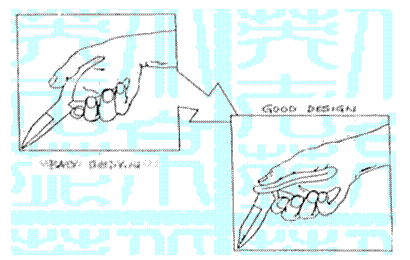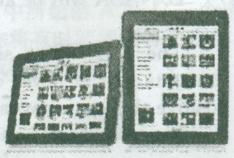题目内容
Good tool design is important in the prevention of overuse injuries. Well-designed tools and equipment will require less force to operate them and prevent awkward (别扭的) hand positions. They will allow the worker to keep the elbows (肘) next to the body to prevent damage to the shoulder and arm.
Overuse injuries can therefore be prevented or reduced if the employer provides, and workers use:
power tools rather than having to use muscle power
tools with specially designed handles(把手) that allow the wrist (手腕) to keep straight (see the figures图形). This means that hands and wrists are kept in the same position as they would be if they were hanging relaxed at a person’s side

tools with handles that can be held comfortably by the whole hand. This means having a selection of sizes---remember that tools that provide a comfortable firm hold for a person with a very large hand may be awkward for someone with a very small hand. This is a particularly important consideration for women who may use tools originally designed for men
tools that do not press fingers (or flesh )between the handles, and whose handles do not have sharp edges or a small surface area.
56. Which is the best title for the passage?
Good Tool Design for Women B. Importance of Good Tool Design
Tool Design and Prevention of Injuries D. Overuse of Tools and Worker Protection
57. Which of the following describes a well-designed tool?[]
It’s kept close to the body. B. It fully uses muscle power.
It makes users feel relaxed. D. It’s operated with less force.
58. What are the two figures(图形) used to show?
The effective use of the tool. B. The way of operating the tool.
The proper design of the handle. D. The purpose of bending the wrist.
59. In choosing tools for women, ________ of the handle is the most important.
A. the size B. the edge C. the shape D. the position
56-59: CDCA

Good tool design is important in the prevention of overuse injuries. Well designed tools and equipment will require less force to operate them and prevent awkward(别扭的)hand positions. They will allow the worker to keep the elbows(肘)next to the body to prevent damage to the shoulder and arm.
Overuse injuries can therefore be prevented or reduced if the employer provides, and workers use:
●power tools rather than having to use muscle(肌肉)power
●tools with specially designed handles that allow the wrist(手腕)to keep straight
(See Figure 1). This means that hands and wrists are kept in the same position as they would be if they were hanging relaxed at a person’s side
 |
Figure l. Bend the tool, not the wrist
●tools with handles that can be held comfortably by the whole hand. This means having a selection of sizes remember that tools that provide a comfortable firm hold for a person with a very large hand may be awkward for someone with a very small hand. This is a particularly important consideration for women who may use tools originally designed for men.
●tools that do not press fingers (or flesh) between the handles, and whose handles do not have sharp edges or a small surface area.
60.What is the best title for the passage?
A.Good Tool Design for Women.
B.Importance of Good Tool Design.
C.Tool Design and Prevention of Injuries.
D.Overuse of Tools and Worker Protection.
61.Which of the following describes a well-designed tool?
A.It’s kept close to the body. B.It fully uses muscle power.
C.It makes users feel relaxed D.It’s operated with less force.
62.What is Figure 1 used to show?
A.The effective use of the tool.
B.The way of operating the tool.
C.The proper design of the handle.
D.The purpose of bending the wrist.
63.In choosing tools for women, _________ of the handle is the most important.
A.the size B.the edge C.the shape D.the position
Imagine a classroom missing the one thing that’s long been considered a necessary part to reading and writing---paper. No notebooks, no textbooks, no test papers. Nor are there any pencils or pens, which always seems to run out of ink at the critical moment. A “paperless classroom” is what more and more schools are trying to achieve .
Students don’t do any handwriting in this class . Instead , they use palm size , or specially—designed computers. The teacher downloads texts from Internet libraries and sends them to every student’s personal computer. Having computers also means that students use the Web. They can look up information on any subject they’re studying from maths to social science.
High school teacher Judy Herrell in Florida, US, described how her class used the Web to learn about the war in Afghanistan over one year ago. We could touch every side of the country through different sites from the forest to refugee camps, she said .“Using a book that’s three or four years old is impossible.”And exams can go on line too. At a high school in Tennessee, US, students take tests on their own computers. The teacher records the grades on the network for everyone to see and then copies them to his own electronic grade book. A paperless classroom is a big step towards reducing the waste of paper. High school teacher Stephanie—Sorrell in Kentucky,US, said she used to give about 900 pieces of paper each week to each student.
“Think about the money and trees we could save with the computers,”she said .But, with all this technology, there is always the risk that the machines will break down. So , in case of a power failure or technical problems, paper textbooks are still widely available for these hi—tech students.
【小题1】What does the part of the last sentence in the first paragraph “run out of ink at the critical moment” mean ?
| A.Pens may not write well at the critical moment. |
| B.Pens get lost easily , so you may not find them at the critical moment. |
| C.Pens may have little or no ink at the critical moment |
| D.Pens use ink, while pencils don’t. |
| A.the Web could take them everywhere |
| B.the Web taught them a lot. |
| C.the Web is a good tool for information. |
| D.the Web , better than the textbooks ,can give the latest and comprehensive information. |
| A.students | B.teachers | C.trees | D.computers |
| A.Break into pieces | B.Stop working | C.Fall down | D.Lose control |
Hikosaburo Yasuda of Nakano, Japan, plans to buy an iPad to keep up with junior members in his computer club."It's important to always try new things, otherwise you get left behind," he says.
important to always try new things, otherwise you get left behind," he says. 
Yasuda is 95 years old.He and his colleagues, looking for easier ways to search the Web and send e-mail, represent a potential market for Apple (AAPL)'s iPad.The company has sold 3.27 million iPads since its launch in April,  but doesn't break down sales figures by customer age, making it impossible to know with certainty how many seniors are buying them.However, anecdotal evidence suggests it's a hit with the elderly.
but doesn't break down sales figures by customer age, making it impossible to know with certainty how many seniors are buying them.However, anecdotal evidence suggests it's a hit with the elderly.
The iPad's intuitive interface (直观界面) makes it appealing to senior citizens around the world, says Takahiro Miura, a researcher at the University of Tokyo: "The iPad is a good tool for the elderly because it's very forgiving of mistakes." Miura's team uses computers to help train senior citizens to rejoin the workforce."Unlike the PC, it doesn't require previous knowledge," he says.
James Cordwell, a technology analyst at Atlantic-Equities in London, says the iPad's popularity with the elderly is helping Apple reach beyond its traditional base of younger customer. “The world’s population, especially in developed markets, is getting older, and it’s probably a market where Apple has least entered,” Cordwell says. Elderly users are “a key source of growth for them in the future.”
The elderly in Japan, who make up an estimated 22 percent of the population, may prove particularly receptive to the iPad. They spend more than any other group in the country except for those under 30, according to a report by Japan's Cabinet Office. Motoo Kitamura, 78, a former gas salesman, bought an iPad to help him communicate with his 2-year-old grandson and stave off dementia. "Trying new things like that is a good mental exercise," he says.
【小题1】The underlined part “a hit” in Paragraph 2 may probably mean “ ”.
| A.a hard strike | B.a heavy burden | C.quite popular | D.very familiar |
| A.It has intuitive interface. | B.It is easier to operate. |
| C.It is more accessible to beginners. | D.It is a good mental exercise. |
| A.The people under thirty are the largest consumers in Japan except for the elderly. |
| B.The traditional customers of AAPL’s products are usually the yong. |
| C.The elderly will soon grow into the largest customer group in place of the young. |
| D.The elderly in Japan have great enthusiasm for latest hi – tech products. |
| A.The iPad leads Apple to the elderly |
| B.Ipad hits Japan’s store shelves |
| C.Ipad’s arrival in Tokyo causes Uapanese to reflect |
| D.AAPL attempts to balance the old and the yong |